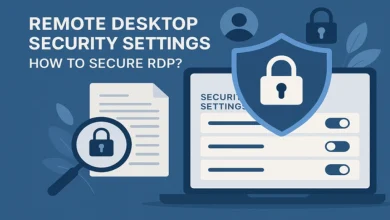What Makes Residential VPNs Different From Traditional VPN Services

Online users face increasing digital privacy threats every day. Thankfully, Virtual Private Networks (VPNs) can secure internet access. These tools protect users from hackers, halt tracking, and stop unlawful data access. Residential and traditional VPNs are the two main types that tackle these security challenges.
While both types accomplish the same results, they function through different techniques and offer separate benefits to individuals.
In this blog post, I will explain what makes residential VPNs different from traditional VPN services.
Let’s begin!
Residential VPNs and Traditional VPN Services Defined
What are Residential VPNs
A Residential VPN routes your internet traffic through IP addresses assigned to real residential users by their Internet Service Providers (ISPs). These IP addresses appear to belong to everyday households.
What are Traditional VPN Services
A Traditional VPN (Virtual Private Network) is a tool that creates a secure, encrypted tunnel between your device and a VPN server, masking your IP and encrypting your data.

Learning How Residential VPNs Differ From Traditional VPNs
Selecting the proper protection tool demands that users learn how the residential and traditional types function distinctly. Below are the main differences that distinguish these two VPNs.
1) Source of IP Address
The IP address source creates the most significant difference between residential and traditional VPNs. Home-based VPNs get their internet addresses from actual residential connections.
In contrast, data centers supply traditional VPNs with addresses that websites can quickly recognize. Thus, users find that residential VPNs work much better for bypassing restrictions. They help people reach blocked content that automatically rejects data center traffic.
2) Privacy and Anonymity
Residential VPNs provide superior privacy protection. They link to websites through genuine home IP addresses resembling typical internet users. Most platforms trust this traffic and don’t block it.
Traditional VPNs use data center addresses instead. Websites can quickly spot these fake addresses, blocking users in the process.
3) Speed and Reliability
Traditional VPNs deliver faster internet speeds than residential options. This is because data center facilities power these connections, which enables them to handle massive internet traffic with ease.
Residential VPNs use individual household internet pathways, which can typically lessen performance. These home-based VPNs are more about offering reliable connections for prolonged usage. This consistency becomes crucial when users choose anonymity instead of quick connection speeds.
4) Common Use Cases
High anonymity tasks like web scraping, marketing research, and SEO analysis suit residential VPNs perfectly. These systems help users appear as real visitors from multiple geographical areas, helping the successful acquisition of data sets.
Traditional VPNs are better suited for regular, everyday protection. Users rely on them for safe internet browsing and reaching geo-blocked content. A marketing professional might use residential VPNs to gather search data from various countries. However, typical users can select traditional VPNs for basic online security and privacy protection.
5) Cost
Residential VPNs cost significantly more than traditional options. Companies pay more because they must manage groups of household IP addresses that prove challenging to obtain and handle.
In contrast, regular VPNs rely on data center IPs, which services can purchase inexpensively and effortlessly. Additionally, they deliver cost-effective solutions for basic individual usage. However, establishments requiring unique capabilities and total anonymity frequently view residential VPNs as worth their higher price.
6) Security and Encryption
Security and encryption remain solid across residential and traditional VPN services to protect user data. However, residential VPNs achieve enhanced security through their detection-resistant nature. These services use authentic home IP addresses that mix naturally with normal internet activity.
Also, they offer better protection against websites trying to detect and stop VPN users. While standard VPNs also have strong security measures, they struggle with platforms that have advanced detection measures.
7) Impact on SEO and Marketing
Marketing professionals use residential VPNs extensively for location-based SEO research. These networks enable access to regional search engine results and comprehensive market analysis. Furthermore, they can help bypass the detection measures that websites deploy against other privacy tools.
Traditional VPNs struggle with these activities since platforms often identify and block them quickly. As a result, companies planning worldwide marketing strategies rely on residential VPNs to gather accurate local search information seamlessly.
8) Connection Stability
Residential VPNs provide more stable connections compared to traditional alternatives. These services employ static IP addresses connected to physical locations, significantly reducing connection disruptions.
In contrast, traditional VPNs frequently face performance problems when their data center servers become overcrowded with users. Therefore, activities that require steady internet access gain greatly from residential VPNs. Tasks like extended video conferences or online gaming work much better with these more reliable connections.
9) Customer Support
Residential VPN companies typically provide specialized customer support services. This proves crucial for businesses and professionals who require dependable, customized assistance.
Traditional VPNs offer basic customer help but don’t always respond well to complex issues like IP rotation or heavy traffic management. For instance, digital marketing teams using residential VPNs for research benefit from round-the-clock support explicitly designed for their unique requirements.
Summing Up
Both residential and traditional VPNs serve vital functions in protecting online privacy. Residential VPNs operate perfectly for users who demand peak anonymity and consistent access to geo-blocked content. They also succeed at specialized activities like digital marketing research.
Traditional VPNs, on the other hand, work better for everyday users by providing budget-friendly, straightforward solutions for secure browsing. Therefore, selecting between them demands thorough consideration of your requirements. Companies and individuals seeking maximum privacy and unlimited access should consider a residential IP VPN as their ideal solution.




